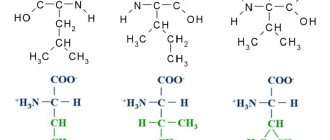What are BCAA's?
BCAA is a group consisting of 3 essential α-amino acids with branched side chains: leucine, isoleucine and valine.
They are not synthesized in the body, so they must be supplied in sufficient quantities with food. Alpha amino acids are structural elements of proteins: in fact, amino acids arranged in peptide chains are proteins. And the amino acids included in the BCAA group make up about 20–25% of the peptide chains of almost all protein compounds. Based on this, we can say that amino acids, like protein, perform the function of synthesizing body tissue, especially muscle tissue. However, almost all dietary supplements are not limited to just one function. This rule also applies to the BCAA group; it has the following effects on the human body:
- In critical situations, they act as sources of energy, as they participate in the process of glucose synthesis.
- Participates in energy metabolism: regulates the processes of protein synthesis and degradation, cell growth, secretion of certain hormones, for example, insulin or serotonin.
- Slightly reduces sensitivity to pain, cold and heat (mainly due to the action of valine).
Thanks to these qualities, BCAA increases muscle endurance during training, protects muscle tissue from destruction and accelerates its recovery.
Functions of BCAA amino acids
They always perform the same function, regardless of their source.
These three branched amino acids are released by the liver after protein is digested. From there they go to:
- Muscles
- Brain
- Heart
- Kidneys
- or remain in the liver.
But most of the BCAA is used by the muscles. Therefore, they are relevant as a supplement for gaining muscle mass.
During exercise, amino acids are catabolized and broken down. This increases a person's need for BCAAs if they engage in intense or strength exercise.
Other amino acids are eventually also used, but for the synthesis of enzymes or hormones.
More is not better, especially in the world of supplements. If there is more of one amino acid in the body than another, the excess is converted into ketones, fatty acid or glucose. It's bad, but not very dangerous.
What is protein?
Protein or proteins are organic compounds consisting of amino acids arranged in peptide chains. In Russia, the word “protein” is most often used for sports supplements, and “proteins” is used to denote the content of these same proteins in any food. But in fact, these words are synonyms and mean the same organic compounds. When entering the body with food, proteins are broken down into amino acids, which are subsequently used as a source of energy or arranged in peptide chains for the synthesis of other types of proteins needed by the body at the moment.
Proteins are one of the most important parts of human nutrition, without which the body simply cannot function. Their role for humans is enormous:
- They are used to build the cytoskeleton of our body cells. First of all, proteins are needed for the synthesis of connective tissue cells, muscle fibers, hair and nails.
- They act as catalysts for many chemical reactions.
- They protect the body from physical and chemical influences, and also strengthen the human immune system.
- They transport some molecules within the body, for example, hemoglobin carries oxygen from the lungs to other parts of the body, and returns collected carbon dioxide to the lungs.
And this is not a complete list of protein functions, but the very nature of proteins is heterogeneous: depending on the composition and structure of the peptide bond, there are a large number of proteins of various types. By taking dietary supplements with protein, a person receives proteins that will break down into a certain set of amino acids. They can be converted to other non-essential amino acids, but in most cases will be used in their original state. This means that taking protein will not provide all of the listed benefits to the same extent. The main role of protein supplements is to accelerate muscle growth by providing a sufficient amount of “building material” and increasing energy reserves when carbohydrates and other energy sources become insufficient.
How to drink protein and BCAA?
The dosage of BCAA is calculated based on the amount of leucine: about 33–35 mg is required per 1 kg of weight. If the standard ratio of amino acids in sports supplements is 2:1:1 (leucine, isoleucine, valine), then a person weighing 75 kg should take about 5 grams of BCAA per day. It is also important to consider the time of administration: the optimal moment is right before or immediately after training. BCAA is also effective immediately after waking up to quickly fill the body depleted during the night with amino acids.
Protein dosage is calculated more simply: 1–2 grams per 1 kg of body weight. The more frequent and intense the training, the closer the dosage should be to 2 g/kg. The second factor in choosing dosage is nutrition: if an athlete eats a lot of meat, dairy products and other protein-rich foods, then the need for protein supplements is reduced. When digested, proteins are broken down into amino acids; this process takes time, so the moment of taking the dietary supplement does not play an important role. The main thing is to consistently consume the daily requirement every day.
The best BCAA and proteins!
We offer you the 3 best BCAA options and the 3 highest quality proteins!
Essential amino acid complexes
Killer Labz Brute BCAA
KIller Labz managed to create a new generation of BCAA with an extreme composition to achieve unprecedented heights in bodybuilding. In addition to the classic three essential amino acids, this product contains other components that contribute to the growth of mass and strength.
- BCAA are essential amino acids in almost any sport. Stimulate muscle growth, fat burning and slow down catabolism.
- 5-a-hydroxy-laxogenin is a natural steroid that accelerates protein synthesis by 200% and blocks cortisol.
- Epicatechin - has an antioxidant effect, stimulates the growth of muscle mass and strength.
Blackstone Labs Resurgence
Do you want to get a powerful burst of energy and speed up muscle recovery after training? Choose this product, which will relieve you of powerlessness in the morning and poor health throughout the day. In addition to the traditional leucine, isoleucine, valine and a complex of vitamins, the manufacturer has added other components to the composition.
- HICA – increases endurance and improves performance, accelerates mass growth.
- Choline – improves stress resistance, protects the brain from the harmful effects of external factors.
- Noopept is a mild nootropic.
- Theobromine is an antioxidant and mild central nervous system stimulant.
Protein and BCAA: are there any differences?
So, BCAA is a set of three specific amino acids, and protein is a substance consisting of many similar amino acids. There are only 2 main differences between BCAA and protein:
- When protein enters the body, it is broken down into amino acids, and the amino acids are absorbed in their original form.
- BCAA contains only 3 basic and most essential amino acids. And protein is made up of many different alpha amino acids, including the BCAA group.
However, these differences do not help answer the question: which is better, protein or BCAA? The fact is that each body is unique, so the effect of different dietary supplements varies among people. Moreover, even for the same person, one dietary supplement can have different effects at different times. The effect of a particular supplement depends on the state of a person’s health, his diet and the deficiency or surplus of any substances. If one of the dietary supplements brings a greater effect at one point, you should not drink it non-stop. The use of nutritional supplements, like all nutrition in general, should be varied and balanced: you should not give up BCAA in favor of protein or vice versa. Both dietary supplements have a powerful effect on the development of athletes' muscles.
What is protein and why is it important?
Protein is the most important macronutrient the body needs as it is found in every cell of our body. It consists of hair, skin, nails, muscles and ligaments. Eating enough of it is important for everyday life, but it's especially important if you're working out hard in the gym. After all, protein is a product that allows muscles to grow. Doctors recommend that the average person consume about 0.7 grams of protein per kilogram of body weight per day. If you exercise regularly (especially strength training), you should aim for 2 grams of protein per kilogram of body weight. All proteins are made up of even smaller building blocks, which you know are called amino acids. There are 20 amino acids in the human body. Nine of them are called “essential” because the body is unable to synthesize them and must obtain them from food. Taking protein and amino acids not only helps build muscle, but also prevents muscle loss, reduces fatigue, and shortens recovery time after exercise.
Can I take BCAA with protein?
Although BCAA and protein are of the same nature, they go well together. To speed up muscle development, many athletes take BCAA and protein together. But based on the fact that the protein already contains a BCAA group, the question arises: are BCAA really necessary if you take protein? The answer to this question is individual for each athlete:
- With frequent and high-quality training, taking supplements together will accelerate muscle growth and development. BCAA is absorbed faster, so it will charge and nourish the body immediately after taking it, and protein will provide the necessary amount of protein, which will be absorbed for a long time.
- On the contrary, with infrequent, short and light training, the combined use of supplements may become excessive. Beginners do not need to create complexes of dietary supplements: it is enough to alternate courses of BCAA, protein and other dietary supplements.
But sometimes you want to achieve the effect as quickly as possible, and then the question still arises: how to combine protein and BCAA?
What to choose?
We looked at each of the complexes - proteins and bcaa. Which is better to choose? Here, each athlete decides for himself:
- The advantage of protein is a complete composition of amino acids plus bcaa. The downside is the low rate of absorption by the body. This is logical, because the body itself has to break down protein into a number of necessary amino acids.
- The advantage of bts is almost instant access to muscle fibers, which gives optimal results. Minus – inferiority (“truncated” composition of amino acids).
How to take BCAA with protein together?
If the training is truly grueling, then it will only bring benefits if you eat well. Our body will need a sufficient amount of protein, otherwise the muscles will take a long time to recover, and training can only do harm. To provide the body with protein and amino acids, BCAA and whey protein are taken according to the following scheme:
- In the morning after waking up, you can take both a protein supplement and BCAA.
- 30–40 minutes before the start of your workout, you need to take the protein again.
- BCAA is taken right before the start of a workout or immediately after it ends.
- After 20–30 minutes, a portion of protein is taken again.
Important! This regimen is used only for whey-type protein supplements. Casein takes much longer to digest, so it is consumed at night or during long breaks between meals.
Delivery throughout Russia You can order sports nutrition in the KULTURIST#1 online store anywhere in Russia.
More detailed information about delivery can be found on the “Delivery and Payment” page. Addresses of retail stores #1 St. Petersburg Stachek Avenue 96k3, st. m. Avtovo
#2 Novorossiysk st. Yuzhnaya, 21
#3 Sochi st. 20th Mountain Rifle Division, 18a
When is the best time to take BCAA - before, after or during training?
Best time to take:
- Pre-workout: Immediately before strength training. This will help you maintain muscle mass or gain additional muscle mass.
- Post-workout: Immediately after exercise. It will help muscles recover and return to working condition faster.
- In the morning after waking up: it will help stop catabolism and maintain muscle volume.
- Before bed: it will refuel your muscles with energy and allow them to gain mass overnight.
Taking BCAA at all these times, 4 times a day, is common if it is important to you to preserve as much muscle as possible, especially when in a calorie deficit, for example, when properly cutting the body.
But supplements cannot be used as a meal replacement, which gives another point in favor of whey, although here too you should not abuse it.
BCAA, creatine and protein: how to take a complex of 3 supplements?
Creatine monohydrate is another effective supplement that will enhance your workout performance. Unlike BCAA and protein, it does not have an amino acid base and is taken to replenish the level of ATP - a universal source of energy for all biochemical processes.
If you take BCAA, creatine, and protein together, then the above regimen is followed, but 2 doses of creatine monohydrate are added to it. It should be consumed with meals, the daily dosage is 3–6 grams.
Return to list
Where to buy BCAAs and protein that combine with each other
I can recommend a protein that is rightfully considered the best on the market. This is Optimum Nutrition, Gold Standard, 100% whey protein . Weight 2.27 kg. Price 4,142 rubles.
BCAA - best buy California Gold Nutrition, AjiPure Branched Chain Amino Acids .
I’ve been drinking this combination myself for many years. Excellent taste, shape, I feel an excellent effect.











